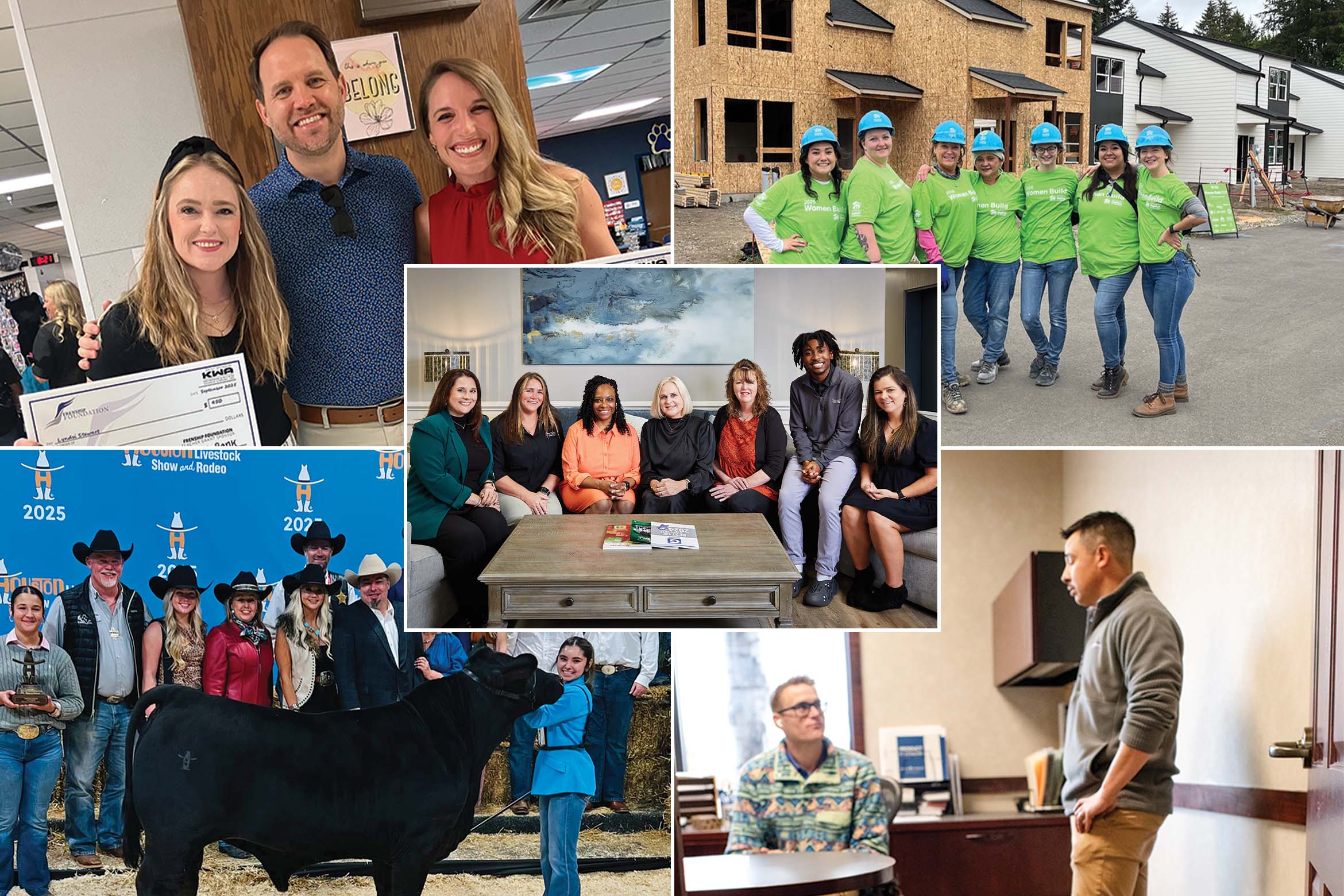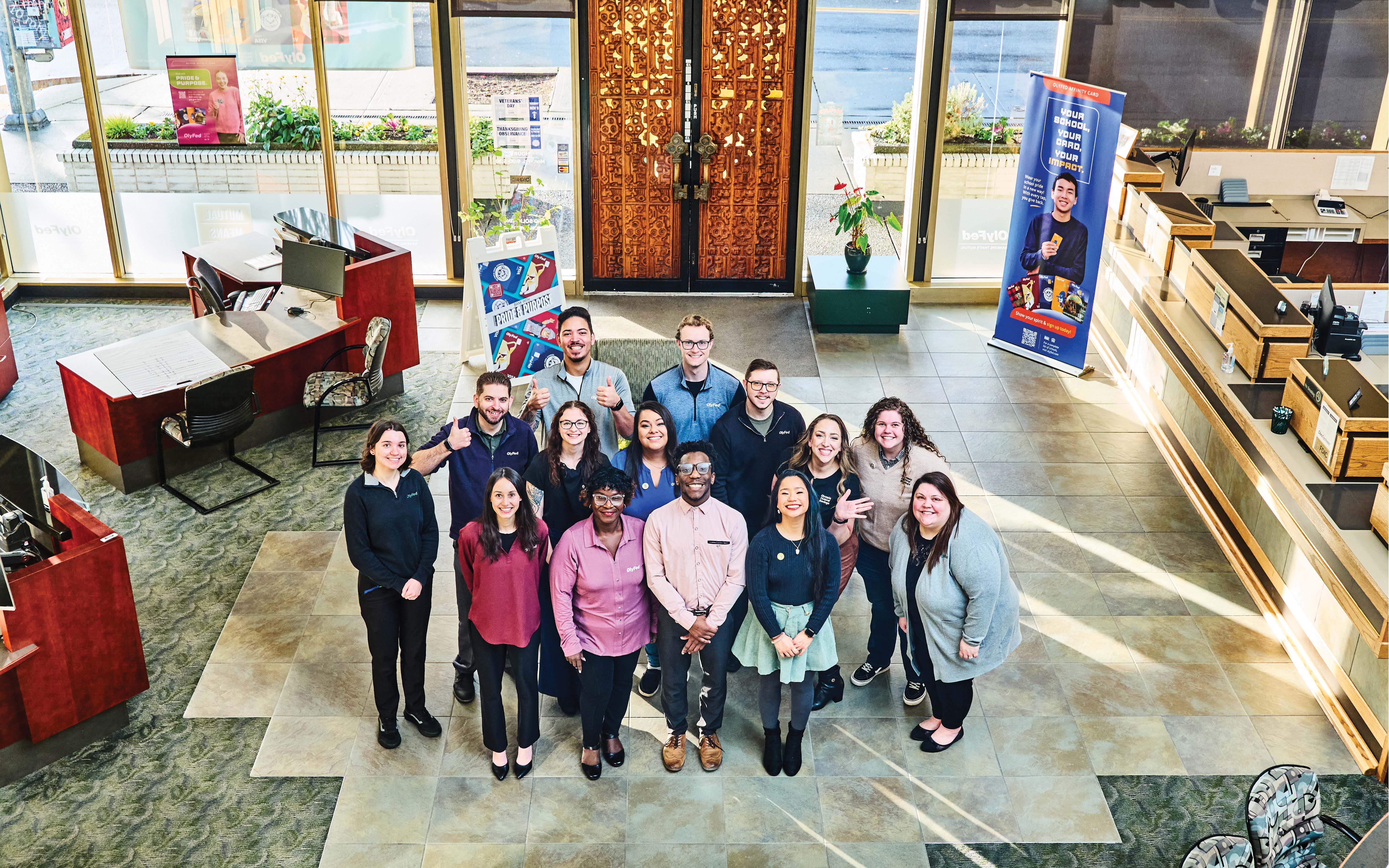May marks Asian American and Pacific Islander Heritage Month—and these Asian American-led community banks are adding to that heritage every single day by helping bring dreams within reach. We asked them about the unique challenges and satisfactions of their work.
These Asian-American led banks are helping their communities
May 01, 2022 / By Roshan McArthur
May marks Asian American and Pacific Islander Heritage Month—and these Asian American-led community banks are adding to that heritage every single day by helping bring dreams within reach. We asked them about the unique challenges and satisfactions of their work.
Asian Bank | Philadelphia
James Wang is one of the founding members of Asian Bank, which was established in 1999 to meet the needs of the Asian community in Philadelphia. Wang, now president and CEO, understands what the needs of the community are because, as an Asian of Chinese descent, he is part of it.
The $333 million-asset community bank is based in Philadelphia’s Chinatown with a second branch in the northeast metro, where many customers don’t speak English. The language barrier, Wang says, is a double challenge: being unable to communicate and fearing being mocked for that lack of fluency. A second challenge, he notes, is that many recent immigrants don’t understand the banking system and don’t know which questions to ask. As a result, Asian Bank must be highly accessible. “We’re open six days a week,” says Wang, “and within our branch you’ll hear four or five different dialects of Chinese being spoken, and we have Indonesian capabilities.”
Wang observed the kneejerk xenophobia of early 2020 as the pandemic unfurled. “At that time,” he says, “even our mayor [Jim Kenney] felt the impact was such that he led a team and ate at a place in Chinatown to say, ‘You know what, it’s OK to come here.’”
Wang, who is vice chairman of ICBA’s Policy Development Committee and a member of its Minority Bank Advisory Council, applauds his team at Asian Bank for their resiliency during that time.
“We are a small bank, so we didn’t really have the luxury or the ability to offer remote work to anybody. We pretty much never left,” he says. “Had it not been for the commitment of our employees to show up for work and then continue to be in the branches [and] work with clients that prefer to come into the branches during those times, I don’t think we would have survived.”
He and his team contribute volunteer hours, grants and donations to local community organizations, but Asian Bank’s biggest role is financing businesses and real estate purchases that help build wealth. He cites the example of Xin Fu Lin, a new immigrant who opened a takeout restaurant about 20 years ago. From there, Lin opened two or three additional locations, then invested in real estate. He recently sold his takeout business to focus on his 15 to 20 investment properties. It’s a success story for Lin, but also for the other immigrants he’s giving opportunities to. “I think that, for us, is most rewarding,” says Wang, “seeing more people creating additional housing or retail, which provides the opportunity for small businesses to flourish and people to move in and become the patrons of those businesses.”

Abacus Federal Savings Bank president and CEO Jill Sung (on right) celebrates 2021’s Lunar New Year with bank director Vera Sung at the community bank’s Bowery branch in New York City. Lunar New Year is celebrated at the end of January or beginning of February.
Abacus Federal Savings Bank | New York City
Ask Jill Sung about her community bank’s mission, and it’s clear there’s no separating it from the neighborhood in which it was born: New York City’s Chinatown. Founded in 1984 by a group of immigrant businessmen, including her father Thomas Sung, Abacus Federal Savings Bank was created for a very specific reason: to redress economic imbalance.
At the time, Sung’s father felt the Chinatown community did not have the financial services it needed to prosper in the United States. “And he felt that a lot of that ‘lack of’ was due to discrimination against the Asian American community, specifically the Chinese American community,” Sung says. “He is a businessman, and so he felt that directly himself.”
A lawyer by training, Sung has worked at $336 million-asset Abacus since the mid-nineties and became CEO in 2004. She is also a member of the ICBA board of directors. While she is aware that the bank cannot take a political stance, Sung is very much an activist, fighting for the rights of her community, as her father has always done.
“A lot of businesses in Chinatown do not do electronic transactions. Sometimes they only accept cash. But they’re often able to run their business very successfully, very independently through [networks].”
— Jill Sung, Abacus Federal Savings Bank
First-generation immigrant needs are still the focus of the bank, which helps them overcome challenges ranging from language barriers to navigating an unfamiliar financial system. However, the pandemic exposed many additional challenges the Asian American community in New York faces today, and it has taken a disproportionate toll on local businesses.
“Our community generally tends to be very independent,” says Sung. “This pandemic exposed how that independence was really fragile. A lot of businesses in Chinatown do not do electronic transactions. Sometimes they only accept cash. But they’re often able to run their business very successfully, very independently, through a network of local vendors and suppliers.”
Because of the connections between small businesses and wholesalers, a portion of Chinatown’s economy is localized. However, if those networks are broken or damaged, the negative impact on the community’s small businesses is doubled, as both the vendors and their suppliers become vulnerable, she adds.
When we spoke to Sung for this article, she had just returned from a vigil for a young Asian American woman who was recently murdered in Chinatown. Hate crimes, and crime in general, she says, are becoming a bigger challenge for the community, requiring more vigilance and less trust of one’s surroundings. However, she’s been conscious of the community’s vulnerability to crime for a long time.
“For small businesses, a lot of their real estate is owned by small property owners, who often inherit it from their family, generation from generation,” Sung explains. “And if those people are not given the support to be able to maintain that, then they’re going to give up, they’re going to move out, and they’re going to sell to some other person, probably a big conglomerate. These big developers come in, they swoop down, and then they start gentrifying.
“This is something that is very concerning to my family,” she adds. “We’re watching it, and it’s very, very scary. Personally, in the sense of your culture being wiped away, your history, the legacy that your parents had provided, who you are and your identity. And for your community, people who are vulnerable—where are they going to go?”
Sung sees Abacus’s role as advocating for those who don’t always have the tools to help themselves. Throughout the pandemic, the community bank helped nonprofits, small businesses and arts groups apply for Federal Home Loan Bank of New York’s small business recovery grants, a program that was enormously beneficial to groups such as the Chinese Music Ensemble of New York. “We felt that a lot of the small cultural art groups were completely ignored,” says Sung. “If Broadway can’t survive, how can they survive?”
As a banker, Sung acknowledges she must maintain some neutrality. “But we also can’t be in a scenario where we are so neutral that we would just kind of fade into the background,” she says. “There are very specific things that very clearly affect the financial success of our community that are not right.”
Customer Story: The Chinese Music Ensemble of New York
The Chinese Music Ensemble of New York (CMENY) was one of the arts organizations that received a business recovery grant thanks to Abacus Federal Savings Bank. Founded in 1961, it is the only full-scale classical Chinese orchestra in the U.S., with members from China, Japan, Taiwan, Hong Kong, Singapore and Mongolia, as well as first-generation Chinese Americans. It performs two large-scale concerts each year, as well as smaller community events that are often free of charge. In 2020 and most of 2021, all performances were cancelled, which led to a considerable loss of revenue.
“We’ve been in the community for many, many years,” says co-director Anchi Lin, “and if there are special events that are going on, we’re invited to go. So, Jill [Sung] knew about us, and we actually did not know about this funding opportunity.” Sung, president and CEO of Abacus Federal Savings Bank, reached out to Lin’s co-director Hongtao Sun, and they spent nearly two months putting together an application.
CMENY was able to resume events in October 2021, and the grant is helping fund the rental of a rehearsal space in Chinatown as well as a concert at one of the Carnegie Halls in June. A delayed 60th anniversary celebration, it’s an auspicious occasion in numerological terms, marking the end of one life cycle—and new beginnings.
Mission National Bank | San Francisco
In 1982, a group of local businessmen founded a bank in San Francisco’s Mission District for the underserved. Though its majority shareholder is now Asian American, Mission National Bank’s focus remains the same: over 90% of its customers are immigrants.

Ming Chow, president and CFO of Mission National Bank
As an immigrant himself, president and chief financial officer Ming Chow is passionate about the community bank’s focus. “I understand customers who are first-generation [or] second-generation immigrants. Many of them are not offered the same access to capital,” he says, adding that many don’t have access to financial services in large or regional banks.
Chow recognizes that there is also some resistance from immigrants themselves. “Some customers are elderly,” he says. “They don’t believe in the banking system. They tend to go underground and get [financially] abused.”
Chow notes that many customers also have a fear of the government and IRS, which makes them wary of discussing financial matters. So, Mission National Bank focuses on financial education, using the FDIC’s Money Smart program to distribute free educational materials to its adult customers and visiting middle and high schools to teach financial literacy.
For Chow, the $220 million-asset community bank is all about social impact, and two of the groups it chooses to support are owners of small care facilities for the elderly or developmentally challenged, and owners of single-room-occupancy units, which are critically important for low-income residents, the homeless and former prison inmates looking to re-enter the community.
As a community bank leader, Chow believes his team has to be all-in on social impact. “If you are in a position to make a difference,” he says, “don’t waste it.”

Thanh Pham, president of California International Bank
California International Bank | Westminster, Calif.
Thanh Pham was born in a refugee camp in Thailand after his family fled Vietnam. Just before he turned two, his family emigrated to South Bend, Ind. In 2017, Pham was working in corporate banking in Chicago when he was offered a position at California International Bank in Westminster—the city within Orange County better known as Little Saigon. The community bank was founded in 2005 by a group of local business leaders to serve the needs of the largest Vietnamese population outside of Saigon.
Pham was drawn to California International Bank because he saw it as a chance to make a positive impact on his community. Now president, he admits the $85 million-asset community bank often gets the most difficult customers that the bigger banks don’t want. “So that is the challenge,” he says, “just to make sure that we can serve everybody when their demands or their risk profile is a little bit tougher.”
For example, he explains, larger banks will reject foreign national depositors if they can’t verify a mailing address in Vietnam, and often loan applicants don’t have business models that check all the standard boxes. Those are the customers who usually fall between the cracks—and give up. Pham and his team believe in digging deeper, going the extra mile, asking different questions.

Pham, president of California International Bank, highlights the community bank’s Volunteer Income Tax Assistance program, which helps low- and moderate-income people prepare their tax returns. In 2021, the bank prepared 274 returns, saving both customers and noncustomers between $300 and $400 each.
An achievement he is particularly proud of is California International Bank’s work in helping low- to moderate-income households with their tax returns through the Volunteer Income Tax Assistance program. In 2021, the community bank prepared 274 returns, saving customers and noncustomers an average of $300 to $400. “Every once in a while,” he says, “when people get a bigger-than-expected refund, they break down and cry with joy. So that’s always cool.”
California International Bank is small, with just one branch. It’s also the only Vietnamese American bank in the United States, which Pham describes as a “privilege,” but he does feel the pressure to “up their game” and let more people know it exists. “The biggest challenge to the bank,” he says, “is letting people know that we are as safe and secure as the bigger banks out there. People tend to gravitate toward the megabanks. It’s not until they get turned away that they come to us. But their lives could be easier if they just came to us from the start!”
Customer Story: Paul Redman, Just Like The Model, Irvine, Calif.
Thanh Pham, president of California International Bank, describes Paul Redman as one of those customers big banks expect to give up and walk away. Redman emigrated to the United States from Barbados at the age of 17, worked for 20 years as a personal trainer, then decided to buy a retail business selling model home furnishings at discount prices. California International Bank was the only lender that took a chance on him; other banks had rejected him for lack of collateral.
In 2018, California International Bank secured Redman an SBA loan. Within three years, he doubled Just Like The Model’s revenues and tripled his net profit margins, and he’s investing in a new property in Las Vegas with the help of Pham and his team.
“Thanh took a chance on me when nobody else did,” says Redman. “I find it to be a privilege and an honor to be backed by a minority bank. It does absolutely feel as though the little guys are helping each other out, for sure. I don’t feel like an outsider in any shape or form there. It just feels like folks that need an extra hand, oftentimes, helping other folks that need an extra hand.”
Growth opportunities for community banks
The strong Asian American business environment provides plenty of opportunities for community banks to serve these constituents.
- With a population involving more than 40 diverse ethnic demographics, Asian Americans and Pacific Islanders comprise the fastest-growing racial group in the United States, expected to increase from 20 million to more than 51 million by 2060.
- The more than 555,200 Asian-owned and operated businesses in the United States account for 9.9% of all businesses.
- Community banks made 49.6% of PPP loans to Asian American businesses and accounted for 52.8% of PPP dollars, saving 50.9% of jobs at Asian-owned small businesses.
Sources: U.S. Census Bureau, Small Business Administration
Subscribe now
Sign up for the Independent Banker newsletter to receive twice-monthly emails about new issues and must-read content you might have missed.
Sponsored Content
Featured Webinars
Join ICBA Community
Interested in discussing this and other topics? Network with and learn from your peers with the app designed for community bankers.
Subscribe Today
Sign up for Independent Banker eNews to receive twice-monthly emails that alert you when a new issue drops and highlight must-read content you might have missed.
News Watch Today

Join the Conversation with ICBA Community
ICBA Community is an online platform led by community bankers to foster connections, collaborations, and discussions on industry news, best practices, and regulations, while promoting networking, mentorship, and member feedback to guide future initiatives.













